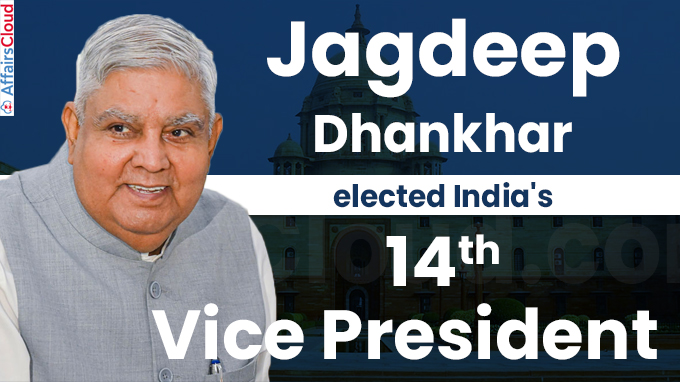 National Democratic Alliance(NDA) candidate and a former West Bengal Governor Jagdeep Dhankhar has won the 16th Vice President elections with 528 votes out of the 710 valid votes against Margaret Alva and became the 14th Vice President of India.
National Democratic Alliance(NDA) candidate and a former West Bengal Governor Jagdeep Dhankhar has won the 16th Vice President elections with 528 votes out of the 710 valid votes against Margaret Alva and became the 14th Vice President of India.
Jagdeep Dhankhar will take the oath of office on 11th August 2022, a day after the term of the incumbent Vice President M Venkaiah Naidu comes to end.
About Jagdeep Dhankhar:
Jagdeep Dhankhar was born in 1951 in Kithana village in Jhunjhunu district, Rajasthan and has been described as Kisan-Putra (farmer’s son) by the Bharatiya Janata Party (BJP).
He joined BJP in 2008 and was appointed as the Governor of West Bengal in 2019.
He was the second leader from Rajasthan after Bhairon Singh Shekhawat to get elected the vice-president of India.
Previous positions:
i.He entered into state politics in 1993, when he also won the Rajasthan Assembly elections from Kishangarh Constituency in Ajmer District from 1993 -1998.
ii.He held the position of Minister of State for Parliamentary Affairs between 1990 and 1991.
iii.The ex-Bengal Governor is also known for being the youngest president of the Rajasthan High Court BAR Association.
He has also been the President of the Rajasthan Olympic Association, and Rajasthan Tennis Association.
About Vice presidential election:
i.The Vice President of India is the second-highest constitutional post in India and is elected through an electoral college consisting of members of the Rajya Sabha and the Lok Sabha with the system of proportional representation by means of the single transferable vote.
- All Members of Parliament (MPs) of the Lok Sabha and the Rajya Sabha, including nominated members, are entitled to vote in the vice presidential election.
- For 2022, 16th Vice-Presidential Election, the Electoral College consists of, 233 elected members of Rajya Sabha, 12 nominated members of Rajya Sabha, and 543 elected members of Lok Sabha.
ii.The Electoral college comprised 788 members, while only 780 members participated in elections that recorded around 93 percent polling due to 8 vacancies in Rajya Sabha.
Vice President of India:
i.The Vice-President, like the president, is elected not directly by the people but by the method of indirect election.
ii.The Vice-President holds office for a term of five years from the date on which he enters upon his office.
Eligibility:
- He should be a citizen of India.
- He should have completed 35 years of age.
- He should be qualified for election as a member of the Rajya Sabha.
- He should not hold any office of profit under the Union government or any state government or any local authority or any other public authority.
The Constitution lays down the following two conditions of the Vice-President’s office:
i.He should not be a member of either House of Parliament or a House of the state legislature. If any such person is elected Vice-President, he is deemed to have vacated his seat in that House on the date on which he enters upon his office as Vice-President.
ii.He should not hold any other office of profit.
Constitution of India: Articles related to Vice President Appointment and Functions:
- Article 63 – The Vice-President of India.
- Article 64 – The Vice-President to be ex officio Chairman of the Council of States
- Article 65 – The Vice-President to act as President or to discharge his functions during casual vacancies in the office, or during the absence, of the President.
- Article 66 – Election of Vice-President.
- Article 67 – Term of office of Vice-President.
- Article 68 – Time of holding election to fill vacancy in the office of Vice-President and the term of office of person elected to fill casual vacancy.
- Article 69 – Oath or affirmation by the Vice-President.




